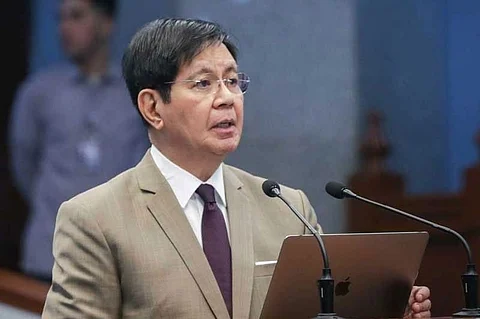
- NEWS
- the EDIT
- COMMENTARY
- BUSINESS
- LIFE
- SHOW
- ACTION
- GLOBAL GOALS
- SNAPS
- DYARYO TIRADA
- MORE

Unfair. Insulting.
Several senators on Wednesday slammed the new trade deal forged between the Philippines and the United States, calling it disappointing and lopsided.
The lawmakers decried President Ferdinand Marcos Jr.’s failure to negotiate better terms than the steep 19-percent tariff slapped on Philippine exports to the US, while American goods will enter the country tariff-free, this despite the decades of a strong relationship with Washington.
Senator Panfilo Lacson condemned the trade agreement, calling it “unfair” and “insulting,” criticizing the stark imbalance of the deal.
In a statement, he said, “Nineteen percent versus zero tariff is definitely not the most fair deal between decades-old friends and allies like the United States and the Philippines.”
He said the outcome of the negotiations reflected a lack of respect for the Philippines.
“If I may add, it is the worst insult a host can throw at his guest. It is time for us to look for other trade partners,” Lacson said.
Lopsided deal
The President’s sister, Senator Imee Marcos, saw the tariff deal as “heavily favoring” American exports at the expense of Philippine goods.
“I still need to read the full agreement, but ask anyone — an expert or an ordinary person — a 19-percent tariff for the Philippines versus 0 percent for the Americans, how exactly did we win in that deal?” she said in Filipino.
Senator JV Ejercito questioned why the Philippines continues to be placed at a disadvantage in trade negotiations with its longtime ally.
“We’re at a huge disadvantage. This is grossly disadvantageous to the Philippines,” he said.
He expressed frustration over what he described as a recurring pattern of unequal treatment, despite the Philippines’ loyalty as a treaty ally of the United States.
“It seems that we’re at a big disadvantage. I thought the Americans saw us as their little brown brothers. So why do we always end up on the losing end in talks like this? If they truly see us as allies, the least they could do is make things fair,” Ejercito said.
Killing agri sector
Senator Francis Pangilinan and Juan Miguel Zubiri noted that the disparity in export tariffs could threaten the country’s agricultural sector.
Pangilinan urged Malacañang to clarify the specifics of the trade deal, particularly which agricultural products are covered.
“Economic stability should not come at the cost of our farmers’ livelihoods,” Pangilinan said. “A zero tariff policy, if not carefully implemented, threatens food security and national development.”
“Seems like we’re getting the short end of the deal. Our export tariff to the US is 19 percent while they get to bring their products here tariff-free,” Zubiri lamented.
He said the arrangement could flood the local market with cheaper imported goods, including poultry, pork, and beef, threatening the livelihood of Filipino farmers and the survival of the country’s agriculture industry.
Zubiri drew comparisons to Japan’s trade terms with the US, noting that both countries impose a 15-percent tariff on each other’s goods — something he believes the Philippines should have also pushed for.
“Japan got the better deal, only 15 percent, and the Americans also pay 15 percent on goods entering their country,” he said.
“If the US truly sees us as a treaty ally, then we should have received the same tariff terms they gave Japan,” he added.
For his part, Senator Tito Sotto had a more optimistic view, describing the meeting between Marcos and US President Donald Trump as “most fruitful and productive.”
